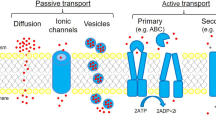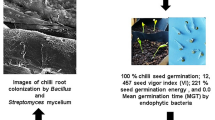Abstract
Plant growth-promoting rhizobacteria stimulate plant growth and development via different mechanisms. In this study, we characterized the effect of volatiles from Bacillus methylotrophicus M4-96 isolated from the maize rhizosphere on root and shoot development, and auxin homeostasis in Arabidopsis thaliana. Phytostimulation occurred after 4 days of interaction between M4-96 and Arabidopsis grown on opposite sides of divided Petri plates, as revealed by enhanced primary root growth, root branching, leaf formation, and shoot biomass accumulation. Analysis of indole-3-acetic acid content revealed two- and threefold higher accumulation in the shoot and root of bacterized seedlings, respectively, compared to uninoculated plants, which was correlated with increased expression of the auxin response marker DR5::GUS. The auxin transport inhibitor 1-naphthylphthalamic acid inhibited primary root growth and lateral root formation in axenically grown seedlings and antagonized the plant growth-promoting effects of M4-96. Analysis of bacterial volatile compounds revealed the presence of four classes of compounds, including ten ketones, eight alcohols, one aldehyde, and two hydrocarbons. However, the abundance of ketones and alcohols represented 88.73 and 8.05%, respectively, of all airborne signals detected, with acetoin being the main compound produced. Application of acetoin had a different effect from application of volatiles, suggesting that either the entire pool or acetoin acting in concert with another unidentified compound underlies the strong phytostimulatory response. Taken together, our results show that B. methylotrophicus M4-96 generates bioactive volatiles that increase the active auxin pool of plants, stimulate the growth and formation of new organs, and reprogram root morphogenesis.









Similar content being viewed by others
References
Altschul SF, Gish W, Miller W, Myers EW, Lipman DJ (1990) Basic local alignment search tool. J Mol Biol 215:403–410. doi:10.1016/S0022-2836(05)80360-2
Amann RI, Ludwig W, Schleifer KH (1995) Phylogenetic identification and in situ detection of individual microbial cells without cultivation. Microbiol Rev 59:143–169
Borshchevskaya LN, Kalinina AN, Sineokii SP (2013) Design of a PCR test based on the gyrA gene sequence for the identification of closely related species of the Bacillus subtilis group. Appl Biochem Microbiol 49:646–655. doi:10.1134/S0003683813070028
Brink S (2016) Unlocking the secrets of the rhizosphere. Trends Plant Sci 21:169–170. doi:10.1016/j.tplants.2016.01.020
Casimiro I, Marchant A, Bhalerao RP, Beeckman T, Dhooge S, Swarup R, Graham N, Inzé D, Sandberg G, Casero PJ, Bennett M (2001) Auxin transport promotes Arabidopsis lateral root initiation. Plant Cell 13:843–852. doi:10.1105/tpc.13.4.843
Dunlap CA, Kim SJ, Kwon SW, Rooney AP (2015) Phylogenetic analysis shows that Bacillus amyloliquefaciens subsp. plantarum is a later heterotypic synonym of Bacillus methylotrophicus. Int J Syst Evol Microbiol 65:2104–2109. doi:10.1099/ijs.0.000226
Ellingsoe P, Johnsen K (2002) Influence of soil sample sizes on the assessment of bacterial community structure. Soil Biol Biochem 34:1701–1707. doi:10.1016/S0038-0717(02)00156-6
Farag M, Ryu C, Summer L, Paré P (2006) GC-MS SPME profiling of rhizobacterial volatiles reveals prospective inducers of growth promotion and induced systemic resistance in plants. Phytochemistry 67:2262–2268. doi:10.1016/j.phytochem.2006.07.021
Fukaki H, Okushima Y, Tasaka M (2007) Auxin-mediated lateral root formation in higher plants. Int Rev Cytol 256:111–137. doi:10.1016/S0074-7696(07)56004-3
Garnica-Vergara A, Barrera-Ortiz S, Muñoz-Parra E, Raya-González J, Macías-Rodríguez L, Ruiz-Herrera L, López-Bucio J (2016) The volatile 6-pentyl-2H-pyran-2-one from Trichoderma atroviride regulates Arabidopsis root morphogenesis via auxin signaling and ethylene insensitive 2 functioning. New Phytol 209:1496–1512. doi:10.1111/nph.13725
Geldner N, Friml J, Stierhof YD, Jurgens G, Palme K (2001) Auxin transport inhibitors block PIN1 cycling and vesicle trafficking. Nature 413:425–428. doi:10.1038/35096571
Gil P, Dewey E, Friml J, Zhao Y, Snowden KC, Putterill J, Palme K, Estelle M, Chory J (2001) BIG: a calossin-like protein required for polar auxin transport in Arabidopsis. Genes Dev 15:1985–1997. doi:10.1101/gad.905201
Gutiérrez-Luna FM, López-Bucio J, Altamirano-Hernández J, Valencia-Cantero E, Reyes de la Cruz H, Macías-Rodríguez L (2010) Plant growth-promoting rhizobacteria modulate root system architecture in Arabidopsis thaliana through volatile organic compound emission. Symbiosis 51:75–83. doi:10.1007/s13199-010-0066-2
Hernández-Salmerón J, Hernández-León R, Orozco-Mosqueda MC, Valencia-Cantero E, Moreno-Hagelsieb G, Santoyo G (2016) Draft genome sequence of the biocontrol and plant growth-promoting rhizobacteria Pseudomonas fluorescens strain UM270. Stand Genomic Sci 11:5. doi:10.1186/s40793-015-0123-9
Ljung K (2013) Auxin metabolism and homeostasis during plant development. Development 140:943–950. doi:10.1242/dev.086363
Lambrecht M, Okon Y, Van de Broek A, Vanderleyden J (2000) Indole-3-acetic acid: a reciprocal signalling molecule in bacteria-plant interaction. Trends Microbiol 8:298–300. doi:10.1016/S0966-842X(00)01732-7
Leyser O (2010) The power of auxin in plants. Plant Physiol 154:501–505. doi:10.1104/pp.110.161323
Madhaiyan M, Poonguzhali S, Kwon SW, Sa TM (2010) Bacillus methylotrophicus sp. nov., a methanol-utilizing, plant-growth-promoting bacterium isolated from rice rhizosphere soil. Int J Syst Evol Microbiol 60:2490–2495. doi:10.1099/ijs.0.015487-0
Malamy JE, Benfey PN (1997) Organization and cell differentiation in lateral root of Arabidopsis thaliana. Development 124:33–44
Mehta P, Walia A, Kakkar N, Shirkot C (2014) Tricalcium phosphate solubilisation by new endophyte Bacillus methylotrophicus CKAM isolated from apple root endosphere and its plant growth-promoting activities. Acta Physiol Plant 36:2033–2045. doi:10.1007/s11738-014-1581-1
Peer WA, Hosein FN, Bandyopadhyay A, Bandyopadhyay A, Makam SN, Otegui MS, Lee GJ, Blakeslee JJ, Cheng Y, Titapiwatanakun B, Yakubov B, Bangari B, Murphy AS (2009) Mutation of the membrane-associated M1 protease APM1 results in distinct embryonic and seedling developmental defects in Arabidopsis. Plant Cell 21:1693–1721. doi:10.1105/tpc.108.059634
Pieterse CMJ, de Jonge R, Berendsen RL (2016) The soil-borne supremacy. Trends Plant Sci 21:171–173. doi:10.1016/j.tplants.2016.01.018
Raya-González J, Velázquez-Becerra C, Barrera-Ortiz S, López-Bucio J, Valencia-Cantero E (2017) N, N-dimethyl hexadecylamine and related amines regulate root morphogenesis via jasmonic acid signaling in Arabidopsis thaliana. Protoplasma 254:1399–11410. doi:10.1007/s00709-016-1031-6
Rückert C, Blom J, Chen X, Reva O, Borriss R (2011) Genome sequence of B. amyloliquefaciens type strain DSM7T reveals differences to plant-associated B. amyloliquefaciens FZB42. J Biotechnol 155:8–85. doi:10.1016/j.jbiotec.2011.01.006
Ryu CM, Farag MA, Hu CH, Reddy MS, Wei HX, Paré PW, Kloepper JW (2003) Bacterial volatiles promote growth in Arabidopsis. Proc Natl Acad Sci U S A 100:4927–4932. doi:10.1073/pnas.0730845100
Sabatini S, Beis D, Wolkenfelt H, Murfett J, Guilfoyle T, Malamy J, Benfey P, Leyser O, Bechtold N, Weisbeek P, Scheres B (1999) An auxin-dependent distal organizer of pattern and polarity in the Arabidopsis root. Cell 99:463–472. doi:10.1016/S0092-8674(00)81535-4
Sharma P, Noronha S (2014) Comparative assessment of factors involved in acetoin synthesis by Bacillus subtilis 168. ISRN Microbiol 2014. doi:10.1155/2014/578682
Spaepen S, Vanderleyden J, Remans R (2007) Indole-3-acetic acid in microbial and microorganism-plant signaling. FEMS Microbiol Rev 31:425–448. doi:10.1111/j.1574-6976.2007.00072.x
Stepanova A, Hoyt J, Hamilton A, Alonso JM (2005) A link between ethylene and auxin uncovered by the characterization of two root-specific ethylene-insensitive mutants in Arabidopsis. Plant Cell 17:2230–2242. doi:10.1105/tpc.105.033365
Tamura K, Stecher G, Peterson D, Filipski A, Kumar S (2013) MEGA6: molecular evolutionary genetics analysis version 6.0. Mol Biol Evol 30:2725–2729. doi:10.1093/molbev/mst197
Ulmasov T, Murfett J, Hagen G, Guilfoyle T (1997) Aux/IAA proteins repress expression of reporter genes containing natural and highly active synthetic auxin response elements. Plant Cell 9:1963–1971. doi:10.1105/tpc.9.11.1963
Valencia-Cantero E, Hernandez-Calderón E, Velásquez-Becerra C, López-Meza JE, Alfaro-Cuevas R, López-Bucio J (2007) Role of dissimilatory fermentative iron-reducing bacteria in Fe uptake by common bean (Phaseolus vulgaris L.) plants grown in alkaline soil. Plant Soil 291:263–273. doi:10.1007/s11104-007-9191-y
Vogel G (2006) Auxin begins to give up its secrets. Science 313:1230–1231. doi:10.1007/s11240-008-9419-4
Woodward AW, Bartel B (2005) Auxin: regulation, action, and interaction. Ann Bot 95:707–735. doi:10.1093/aob/mci083
Zhang H, Kim M, Krishnamachari V, Payton P, Sun Y, Grimson M, Farag M, Ryu C, Allen R, Melo I, Paré P (2007) Rhizobacterial volatile emissions regulate auxin homeostasis and cell expansión in Arabidopsis. Planta 226:839–851. doi:10.1007/s00425-007-0530-2
Acknowledgements
We gratefully acknowledge the Consejo Nacional de Ciencia y Tecnología (CONACYT) (grant number 165738) and the Consejo de la Investigación Científica (UMSNH) (grant number 2.24) for financial support. P. Pérez-Flores is indebted to CONACYT for providing a Master’s fellowship.
Author information
Authors and Affiliations
Corresponding author
Additional information
Handling Editor: Néstor Carrillo
Electronic supplementary material
Fig S1
(TIFF 1566 kb)
Rights and permissions
About this article
Cite this article
Pérez-Flores, P., Valencia-Cantero, E., Altamirano-Hernández, J. et al. Bacillus methylotrophicus M4-96 isolated from maize (Zea mays) rhizoplane increases growth and auxin content in Arabidopsis thaliana via emission of volatiles. Protoplasma 254, 2201–2213 (2017). https://doi.org/10.1007/s00709-017-1109-9
Received:
Accepted:
Published:
Issue Date:
DOI: https://doi.org/10.1007/s00709-017-1109-9




